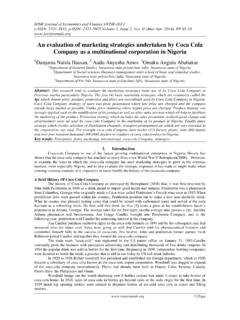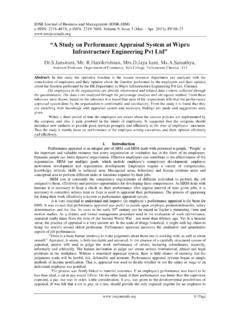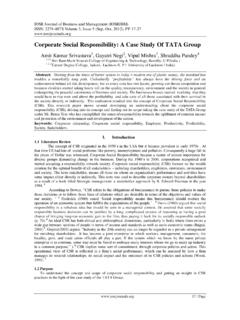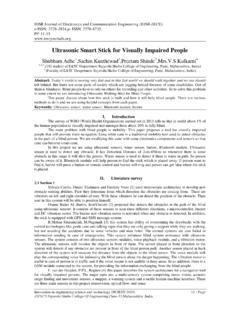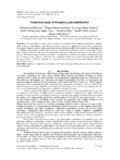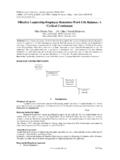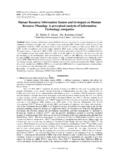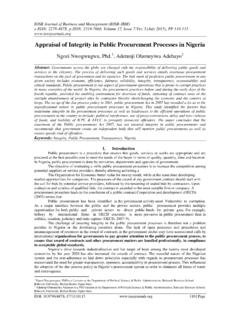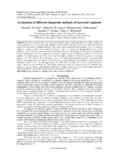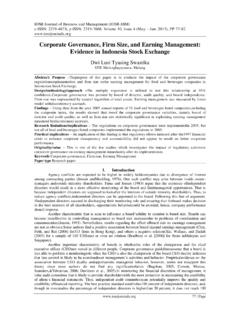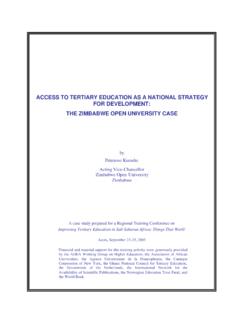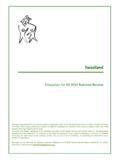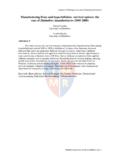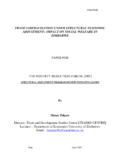Transcription of Compatibility of Employee Personal Values with the ...
1 IOSR Journal of Business and Management (IOSR-JBM) e-ISSN: 2278-487X, p-ISSN: 2319-7668. Volume 16, Issue 2. Ver. I (Feb. 2014), PP 153-158 153 | Page Compatibility of Employee Personal Values with the Organisational Culture of an ODL Institution: Some observations from the Zimbabwe Open University. 1 Daniel Ndudzo 1 Registrar, Zimbabwe Open University, Zimbabwe Abstract: The purpose of this research was to investigate the Compatibility of the Zimbabwe Open University (ZOU) organisational culture with Employee Personal Values . The study used the quantitative and qualitative research methodology. The questionnaire instrument was used to collect data from one hundred and twenty, (120) employees. The study revealed that team work, professionalism, education, strong work ethic are the dominant Personal Values among ZOU employees. These Values are compatible with the dominant culture at ZOU which is basically premised on team orientation, commitment to educational empowerment and the upholding of ethical behaviour and professionalism.
2 The research recommended that the ZOU management should promote additional cultural attributes related to participatory decision making of lower level employees, innovativeness and risk taking to improve organisational performance and survive the competitive world market and open communication between top management and employees. The research also recommended that the institution should recognise and reward outstanding employees. I. Introduction The Zimbabwe Open University (ZOU) is the only institution of higher learning established by an Act of the Zimbabwe Parliament Chapter with a mandate to preserve, advance and transmit knowledge through the ODL system. There are many practices within ZOU that tend to keep the ZOU culture alive and can be used to evaluate the cultural fit between the organization and its employees Personal Values . Many of the human resource practices such as recruitment and selection, performance appraisal, training, and career development reinforce the organization's culture.
3 If employees Personal Values are not compatible with the organisational culture, employees are most likely to leave the organisation and look for different organisations whose cultures they fit better. In contrast, employees who understand and share the organizational culture are better positioned to make choices that match the organisation's goals. When most employees Personal Values are compatible with the organization's culture, less time is spent explaining, instructing, and building consensus before trying something innovative. Employees who are well acculturated also find their work to be more meaningful. When a positive relationship exists between the organization s culture and Employee s Values there is an improvement in Employee engagement, Employee retention and organizational productivity. It is therefore necessary to analyse the Person-Organization (P-O) fit which is defined by (Kristof 1996), as the Compatibility of Employee Personal Values with organisational cultural Values which are determined when one entity provides what the other needs or wants and if an organization and an Employee share similar fundamental characteristics.
4 This involves investigating fundamental organisational characteristics such as Values and goals and checking on the ability of the ZOU culture to fulfill its employees needs or wants such as competitive pay, promotion, recognition and rewards. II. Statement of the Problem There is not known a study carried out in Higher Education Institutions, especially at ZOU, on the Compatibility of Employee Personal Values with organisational culture. This study therefore attempts to assess the Compatibility of Employee Personal Values with the culture of the University. ODL human resources management should strive to ensure a fit between its employees and the organisation. Personal Values guide the Employee s ethical behaviour and these should be compatible with the organisation s culture and Values . III. Purpose of the Study The purpose of the study was to assess the Compatibility of the Zimbabwe Open University culture with Employee Personal Values .
5 IV. Objectives of the study The study was guided by the following objectives: Compatibility of Employee Personal Values with the Organisational Culture of an ODL Institution: 154 | Page To identify the dominant Employee Personal Values at ZOU. To assess the extent to which Employee Personal Values match organisational culture at ZOU. To recommend action required to improve Compatibility of employees Personal Values with the ZOU culture. Key Research Questions The study sought to address the following questions: What are the dominant Personal Values among ZOU employees? To what extent do Employee Personal Values match or fit the ZOU organisational culture? What strategies could be used to improve Compatibility of Employee Personal Values with the ZOU culture? V. Justification of the study The ZOU management will have a clearer understanding of the ZOU culture. In addition possible steps will be taken to improve the Compatibility of Employee Personal Values with the ZOU culture.
6 This study will enable ZOU and other ODL institutions to make improved hiring decisions leading to longer Employee retention, reduced employment costs, increased productivity and profits. Shared Values engender trust, bind the workforce and provide a distinct identity for ZOU. It encourages employees to work to their full potential valuing quality over quantity, creativity over conformity and cooperation over competition. VI. Review of related literature. The following theoretical models explain how organisations enhance Compatibility of Employee Personal Values with organisational culture. Attraction Selection Attrition (ASA) Model, Schneiders (1987). According to the Attraction Selection Attrition (ASA) model, potential employees are attracted to and recruited by an organization because they possess certain Personal characteristics that match the organization's structure, design and culture (Schneider, 1987). The ASA model also predicts that individuals who do not possess the desirable Personal characteristics could be hired but they are likely to leave voluntarily or involuntarily.
7 The ASA process would therefore yield a somewhat homogeneous workforce that is matched with its organization on a variety of dimensions such as Values , personality, goals, needs, abilities, etc. Southwest Airlines (SWA) is an example of a company that successfully applied the Attraction Selection Attrition (ASA) model to align Employee Values with organisational culture. Milliman et-al (2002) observed that SWA's organisational Values were openness, friendliness, joy, humor, teamwork, empowerment, family sense, etc. The company gave priority to the fit of the applicants' Values to its organisational Values rather than their technical abilities. In order to test new applicants the company executed group interviews where the applicants' individual behavior was examined, especially their abilities to be friendly, to tell jokes, to demonstrate teamwork, etc. Cultural Congruence Model, Schein (1992) The Cultural Congruence Model by (Schein 1992) attempts to determine the right fit between the individual and the culture of the organisation.
8 This model is based on the belief that if an organization s culture reinforces its mission and its people believe in it, the organization is more effective. Compatibility of Employee Values and organisational culture can be measured by overall organizational performance, Employee satisfaction, quality of work, customer satisfaction, and earnings/revenues. To measure this congruence, one must first determine the artifacts, Values , and basic assumptions of an organization. Once these basic determinants of culture are assessed, they can be analyzed in terms of their fit with the mission and people. This analysis can take the form of data collection (through observation, surveys, group meetings, and individual patterned interviews), comparative analysis (real stories versus espoused Values ), and gap analysis (determining where the culture does not reinforce the mission of the organisation). This model also determines changes that must be made in the organization s culture.
9 For instance, if an organization states that one of its key Values is innovation and learning, but does not reward people who acquire additional degrees, does not schedule or pay for training, one would assume there is a congruency gap between the organisational Values and the artifacts. VII. Research Methodology The paper is based on an interpretivist epistemological framework. This framework influenced the researcher to adopt a qualitative research paradigm. The questionnaire instrument was used to collect data from the Zimbabwe Open University employees. The researcher carried out face to face interviews with the human Compatibility of Employee Personal Values with the Organisational Culture of an ODL Institution: 155 | Page resources personnel and other employees at ZOU. Questionnaires were distributed to a total of one hundred and twenty, (120) employees. The study used the random sampling technique to select participants for the study.
10 The researcher adopted the random sampling technique because every Employee of ZOU had an equal chance of participating in the survey thereby reducing chances of bias. The researcher addressed potential participants about their willingness to participate in the study by describing its purpose and potential outcomes VIII. Discussion Of Findings Fig ZOU recruits candidates with Values that fit the ZOU culture The study revealed that 74% of the respondents agreed that ZOU recruits candidates with Values that fit the institution s culture. This is evident in the ZOU human resource procedure manual and the Strategic Plan. These two documents emphasize openness, friendliness, teamwork, recruitment of suitable and competent candidates who have core Values that fit the ZOU organisational culture. Making inquiries of the applicant s work philosophy and work habits during the interview process assists management in choosing the most suitable candidate.
